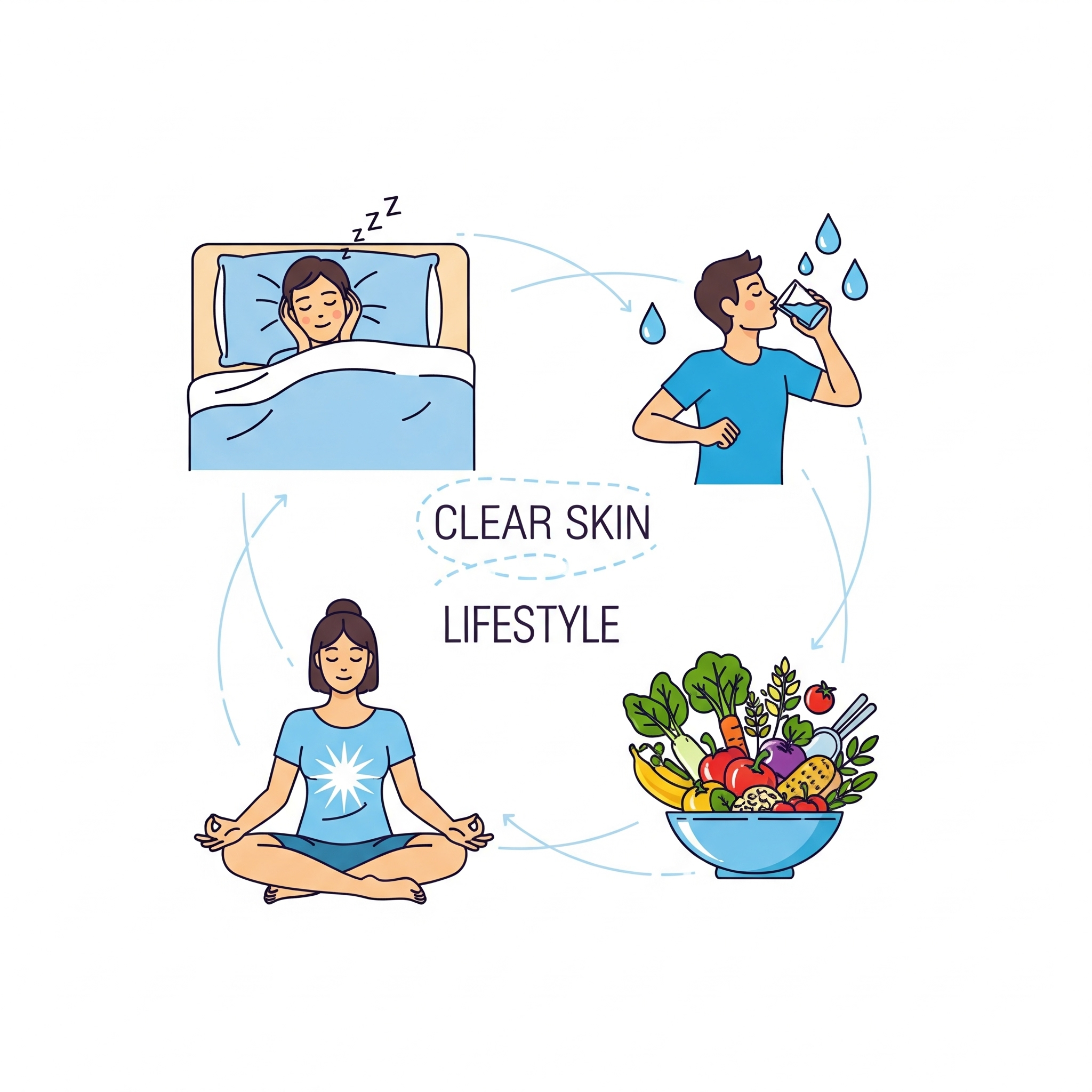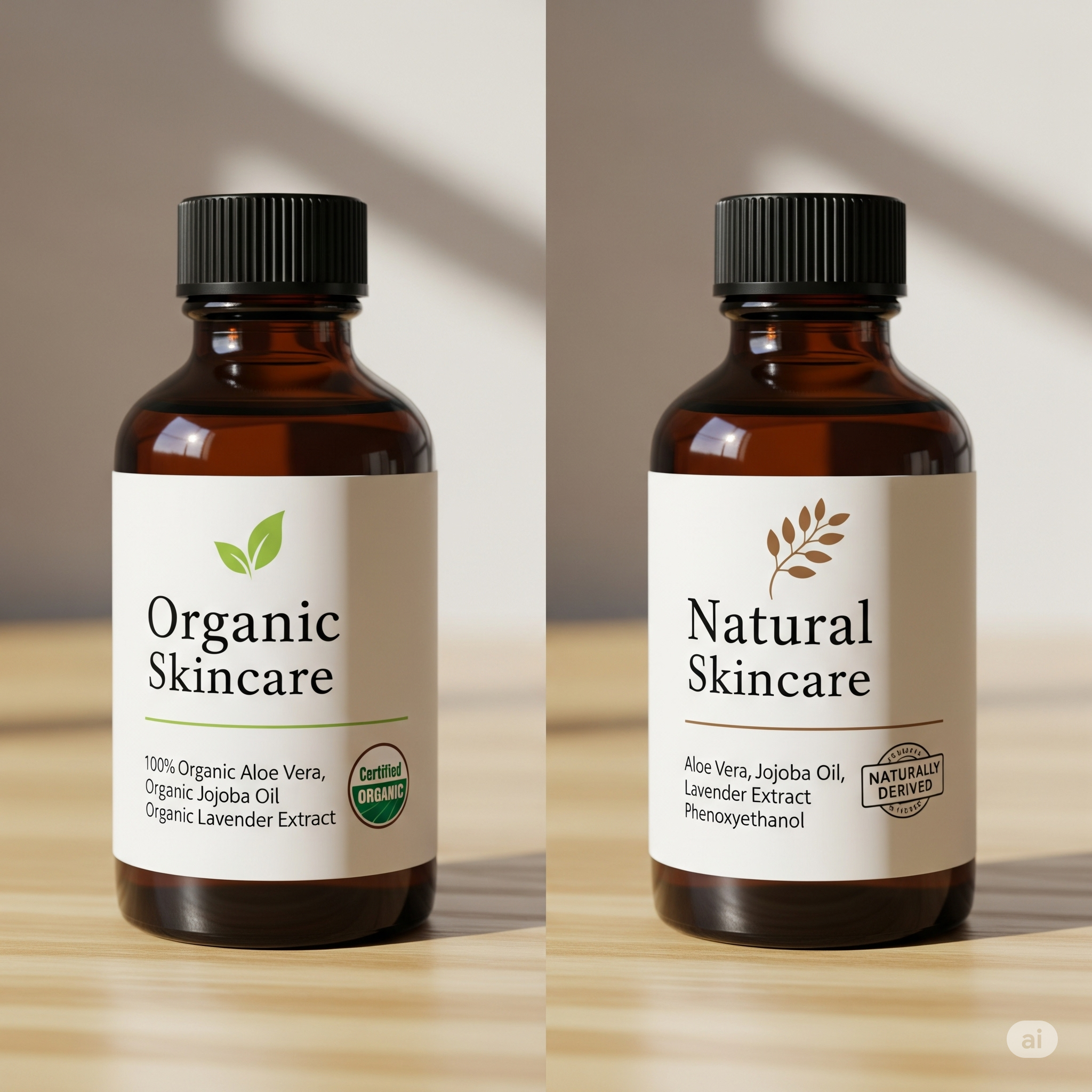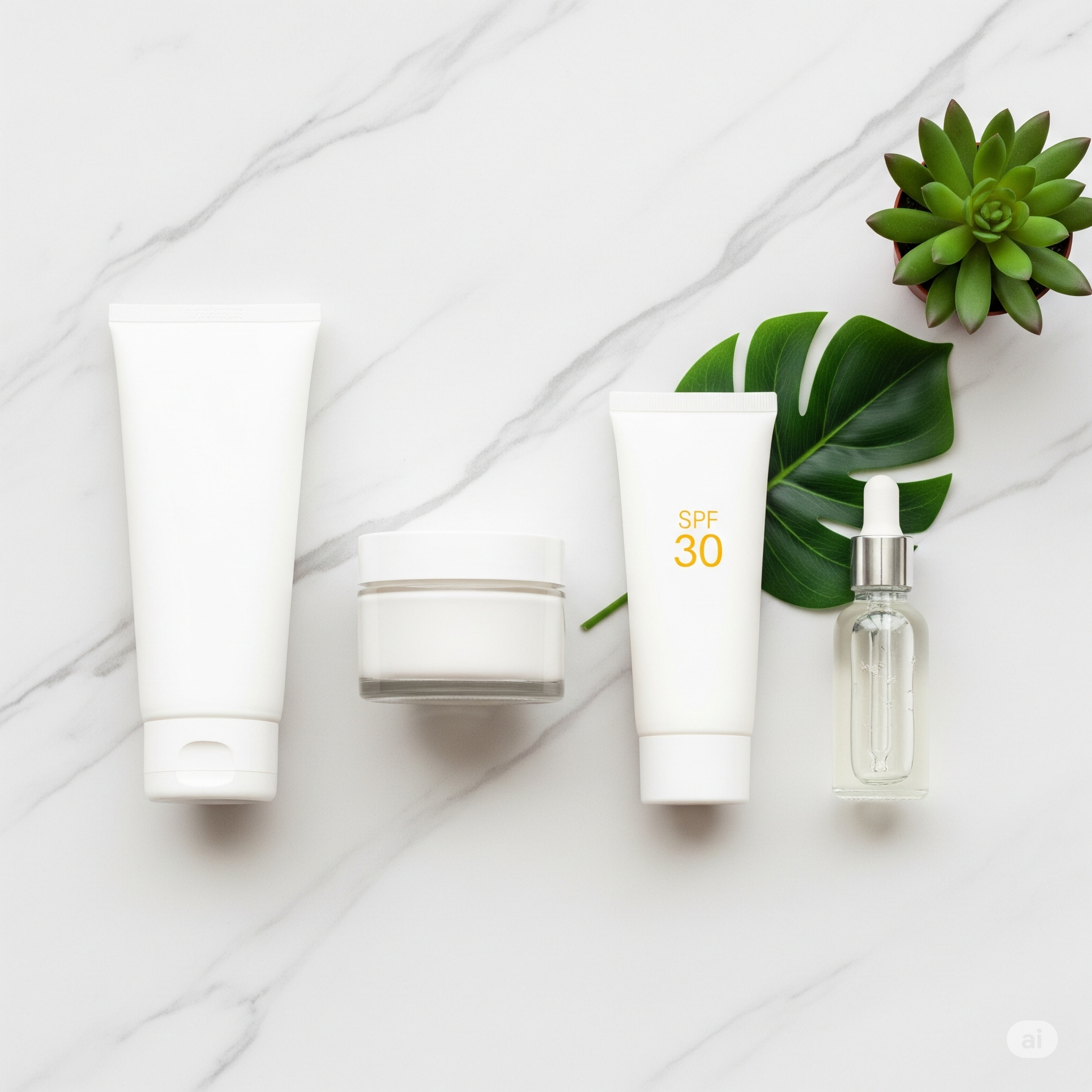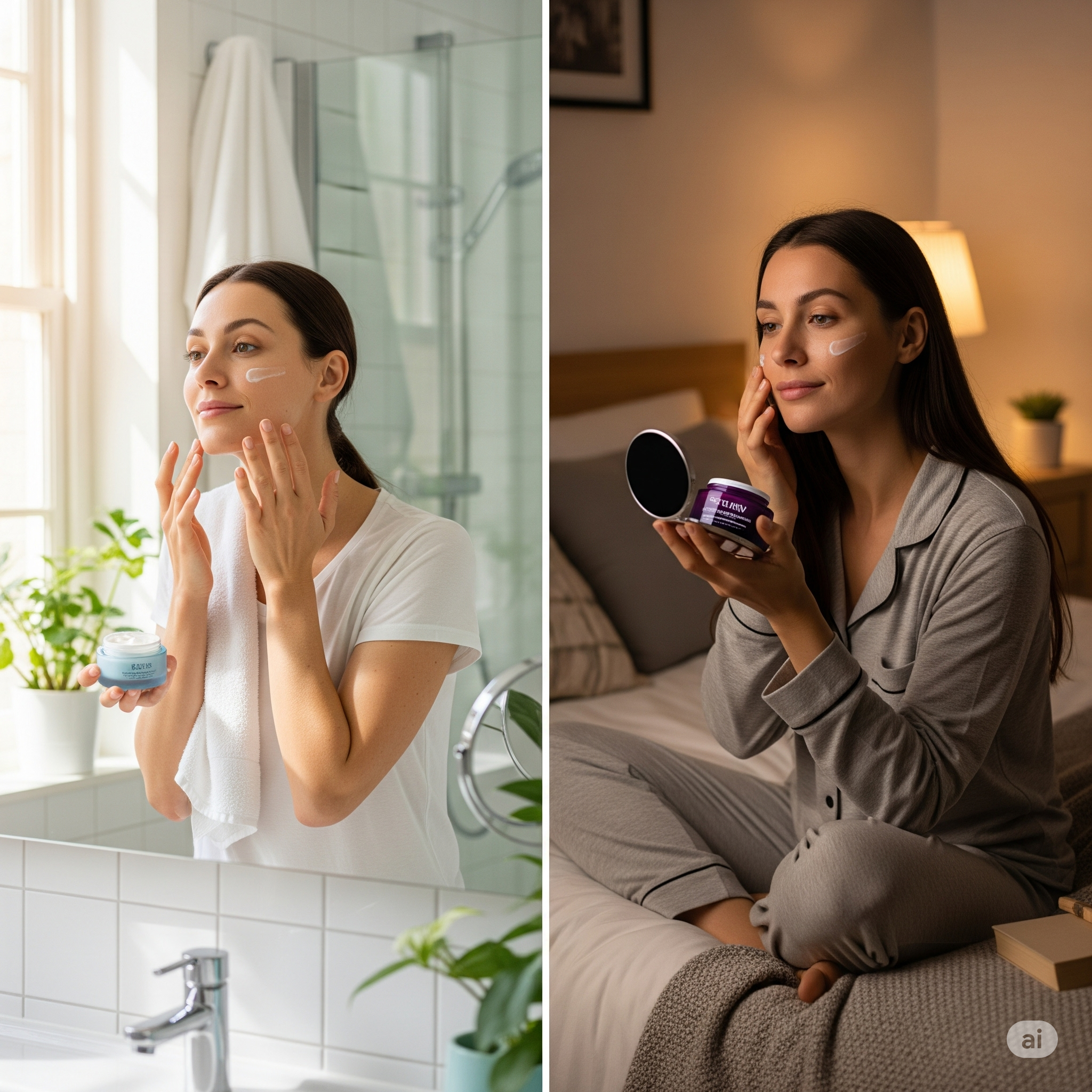Table of Contents
- A. The Skincare Myth: The Product-Centric Approach
- B. The Foundation of Health: How the Body and Skin are Connected
- C. The Gut-Skin Axis: What You Eat Truly Shows on Your Face
- D. The Silent Healer: The Critical Role of Sleep in Skin Repair
- E. The Stress-Skin Connection: How Cortisol Wreaks Havoc
- F. Hydration: The Simplest Secret to a Glowing Complexion
- G. Exercise: Sweating Your Way to Healthier Skin
- H. The Environment: Your Skin’s Unseen Battlefield
- I. The Power of Consistency: Building a Clear Skin Lifestyle
- J. Case Study: The Story of a Transformed Complexion
- K. The Link Between Mindfulness and Clear Skin
- L. Navigating the Skincare Industry with a Lifestyle Mindset
- M. The Long-Term Rewards: A Sustainable Path to Clear Skin
- N. FAQ Section
- O. Conclusion: Embracing the Holistic Approach to Skin Health
A. The Skincare Myth: The Product-Centric Approach
We’ve all been there. Standing in front of a mirror, examining a new blemish, and immediately reaching for the latest viral serum or a potent spot treatment. The skincare industry has masterfully sold us the idea that a flawless complexion is just a product away. We have an endless array of cleansers, toners, serums, masks, and moisturizers, each promising to erase a specific flaw. But what if this product-centric approach is missing the bigger picture? What if the true secret to clear skin isn’t in a bottle, but in our daily habits, our dinner plates, and our nightly routines?
The truth is, our skin is a mirror of our internal health. It’s the largest organ in our body and a reflection of what’s happening on the inside. You can use the most expensive products in the world, but if you’re chronically stressed, sleep-deprived, or eating a diet of processed foods, your skin will likely show the signs of internal turmoil. This article is about shifting the paradigm. It’s about moving from a reactive, product-heavy approach to a proactive, holistic lifestyle that nurtures your skin from the inside out. We’ll explore the interconnected web of factors—from diet and sleep to stress and exercise—that are the real foundation for a radiant, healthy complexion.
B. The Foundation of Health: How the Body and Skin are Connected
To understand why lifestyle is so crucial, you first have to grasp the profound connection between your skin and the rest of your body. Your skin is not a separate entity; it’s a living, breathing organ that is intricately linked to your digestive system, your hormones, your nervous system, and your immune function. This complex network is why a breakout might appear before a big exam, or why a change in diet can lead to either a clear complexion or a flare-up of acne.
This interconnectedness means that targeting a skin issue with an external product is often just addressing the symptom, not the root cause. A topical treatment for acne, for example, might kill bacteria on the surface, but it won’t address the underlying hormonal imbalance or chronic inflammation that is causing the breakouts to begin with. The skin is a messenger. It’s trying to tell you something about your internal state. And listening to that message—by making lifestyle changes—is the key to long-lasting skin health.
C. The Gut-Skin Axis: What You Eat Truly Shows on Your Face
The link between our diet and our skin is one of the most powerful connections in the body. The gut-skin axis is a term used by scientists to describe the two-way communication between our digestive system and our skin. An imbalanced gut microbiome (the collection of bacteria and microorganisms in your digestive tract) can lead to inflammation throughout the body, including in your skin. This inflammation can manifest as acne, eczema, rosacea, and other inflammatory skin conditions.
- High Glycemic Index Foods: Foods like white bread, sugary snacks, and processed cereals cause a rapid spike in blood sugar. This can lead to a surge in insulin and androgens (hormones) that stimulate oil production and inflammation, contributing to acne.
- Dairy Products: While the research is still evolving, some studies suggest that dairy, especially skim milk, can contribute to acne. It contains hormones that can affect our own hormone levels and promote inflammation.
- The Power of Whole Foods: Conversely, a diet rich in anti-inflammatory whole foods can have a transformative effect on your skin.
- Omega-3 Fatty Acids: Found in fatty fish, walnuts, and flaxseeds, these healthy fats help regulate oil production and reduce inflammation.
- Antioxidants: Found in colorful fruits and vegetables (berries, leafy greens, tomatoes), antioxidants combat free radical damage and protect skin from environmental stressors.
- Probiotics: Fermented foods like yogurt, kefir, and sauerkraut contain beneficial bacteria that can improve gut health, which in turn reduces systemic inflammation and promotes a clear complexion.
The food you eat is not just fuel; it’s information for your cells. Feeding your body nourishing, whole foods is one of the most effective and fundamental steps toward achieving clear skin.
D. The Silent Healer: The Critical Role of Sleep in Skin Repair
While we sleep, our bodies don’t just rest; they repair and regenerate. This is especially true for our skin. During deep sleep, our bodies enter a state of active repair, a process that is essential for a healthy complexion.
- Collagen Production: Sleep is when your body produces new collagen, a protein that gives your skin its elasticity and firmness. Chronic sleep deprivation can lead to a decrease in collagen production, contributing to fine lines and wrinkles.
- Cellular Regeneration: The skin’s cellular turnover rate is highest at night. This is when old, damaged skin cells are shed and replaced by new, healthy ones. A lack of sleep disrupts this process, leading to a dull, tired-looking complexion.
- Reduced Inflammation: Sleep is a powerful anti-inflammatory. A lack of sleep increases the production of pro-inflammatory cytokines, which can trigger conditions like acne, psoriasis, and eczema.
Studies have shown a direct correlation between poor sleep quality and increased signs of aging and compromised skin barrier function. Aim for 7-9 hours of quality, uninterrupted sleep per night. Make your bedroom a sanctuary for rest—dark, quiet, and cool—to give your skin the repair time it needs.
E. The Stress-Skin Connection: How Cortisol Wreaks Havoc
You’ve likely experienced it firsthand: a new zit appearing right before a big presentation or a job interview. This isn’t a coincidence; it’s the direct result of the stress-skin connection. When you’re under stress, your body releases a cascade of hormones, most notably cortisol.
Cortisol, the “stress hormone,” in high and prolonged doses, can wreak havoc on your skin.
- Increased Oil Production: Cortisol can stimulate your sebaceous glands to produce more oil, which can clog pores and lead to breakouts.
- Inflammation: Cortisol triggers a pro-inflammatory response in the body, which is a major driver of acne and other skin conditions.
- Breakdown of Collagen: Chronic stress can lead to the breakdown of collagen and elastin, accelerating the aging process and contributing to fine lines.
Managing stress is a non-negotiable part of a clear skin lifestyle. This doesn’t mean eliminating stress entirely, which is impossible, but rather building resilience and finding healthy ways to cope.
- Mindfulness and Meditation: Even 10 minutes of daily mindfulness can lower cortisol levels and calm your nervous system.
- Exercise: Physical activity is a powerful stress reliever.
- Connecting with Others: Spending time with friends and loved ones can release oxytocin, a hormone that counteracts the effects of cortisol.
Your skin is a reflection of your mental state. Taking care of your mind is just as important as taking care of your skin.
F. Hydration: The Simplest Secret to a Glowing Complexion
We often hear that we need to drink more water, but its impact on skin health is often underestimated. Proper hydration is fundamental to a glowing and supple complexion. Your skin is approximately 64% water, and when it’s dehydrated, it can’t function optimally.
- Maintains Skin Elasticity: When your skin is well-hydrated, it’s more elastic and resilient, which can reduce the appearance of fine lines and wrinkles.
- Flushes Toxins: Water helps your body flush out toxins and waste products, which can prevent them from building up and causing skin issues.
- Supports the Skin Barrier: The outermost layer of your skin, the stratum corneum, needs water to maintain its integrity. A compromised skin barrier can lead to dryness, sensitivity, and make your skin more vulnerable to external irritants.
Don’t wait until you’re thirsty to drink water. Carry a reusable water bottle with you and sip throughout the day. Your skin will thank you with a natural, healthy glow.
G. Exercise: Sweating Your Way to Healthier Skin
Regular physical activity is one of the most powerful tools in your lifestyle arsenal for achieving and maintaining clear skin. While the idea of a sweaty workout might seem counterintuitive for a clear complexion, the benefits are undeniable.
- Improved Blood Circulation: Exercise increases blood flow to the skin, which delivers oxygen and essential nutrients to skin cells. This helps nourish the skin from the inside out and gives it a healthy, vibrant appearance.
- Stress Reduction: As mentioned, exercise is a potent stress reliever. It helps lower cortisol levels and releases endorphins, which can improve your mood and reduce the likelihood of stress-induced breakouts.
- Detoxification: Sweating is one of your body’s ways of flushing out toxins. While sweating itself doesn’t “cleanse” your pores, the increased blood flow and detoxification process support a healthier internal environment.
Remember to always cleanse your face immediately after a workout to remove sweat, dirt, and oil that can lead to breakouts. But don’t let the fear of a post-workout zit keep you from this powerful, skin-boosting habit.
H. The Environment: Your Skin’s Unseen Battlefield
Your lifestyle isn’t just about what you do; it’s also about where you are. The environment you live in can have a profound impact on your skin health.
- Air Pollution: Living in a city with high levels of pollution exposes your skin to particulate matter and other toxins that can cause oxidative stress, leading to premature aging and inflammation.
- UV Exposure: Unprotected sun exposure is the leading cause of premature aging, sunspots, and increased risk of skin cancer. Even on cloudy days, UV rays are present.
- Humidity and Climate: Extremely dry or humid climates can affect your skin’s moisture levels and barrier function.
Protecting your skin from environmental stressors is a key part of the lifestyle approach. Wear sunscreen daily (at least SPF 30), and consider incorporating antioxidant serums into your routine to help combat free radical damage from pollution.
I. The Power of Consistency: Building a Clear Skin Lifestyle
The most important takeaway from this holistic approach is that consistency trumps intensity. A single healthy meal or one night of good sleep won’t magically clear your skin. It’s the consistent, daily practice of these healthy habits that creates lasting change.
Think of it like building a house. Products are the paint and furniture—they make it look good on the surface. But a strong, healthy foundation is built with consistent effort:
- Daily hydration
- Nutrient-rich meals
- Regular, quality sleep
- Consistent stress management
- Mindful movement
This foundation is what will give you a complexion that is not just clear for a week, but healthy and resilient for a lifetime.
J. Case Study: The Story of a Transformed Complexion
To illustrate the power of this lifestyle approach, consider the story of Sarah, a 28-year-old marketing manager who struggled with persistent adult acne. She had tried everything: expensive cleansers, prescription creams, and even a few trendy, but ineffective, serums. Her skin was a source of constant frustration.
A dermatologist recommended a simple, product-minimal routine but emphasized lifestyle changes. Sarah was skeptical, but she decided to give it a try. She began by:
- Cutting down on sugary drinks and processed snacks, and started incorporating more vegetables and healthy fats into her diet.
- Aiming for 8 hours of sleep by putting away her phone an hour before bed.
- Starting a 20-minute daily meditation practice to manage her work stress.
- Committing to a brisk walk on her lunch break.
After just three months, Sarah’s skin was noticeably clearer. The angry, cystic breakouts had subsided, and her complexion looked healthier and more radiant. She realized that her skin issues were a symptom of a deeper, internal imbalance. Her lifestyle changes had not just cleared her skin; they had improved her overall health and well-being.
K. The Link Between Mindfulness and Clear Skin
Mindfulness, the practice of being present and aware of the current moment, extends beyond stress management. It can be a powerful tool in your skincare journey.
- Mindful Eating: When you eat mindfully, you pay attention to your food and how it makes you feel. This can help you identify trigger foods that might be contributing to skin issues.
- Mindful Skincare: Instead of mindlessly applying products, practice a mindful skincare routine. Pay attention to the feel of the cleanser on your skin, the scent of a serum, and the sensation of your moisturizer. This simple act of presence can turn a daily chore into a calming ritual.
- Mindful Living: Being mindful of your daily habits—your sleep patterns, your stress triggers, your hydration levels—allows you to be proactive about your health rather than reactive. This proactive awareness is the foundation of a clear skin lifestyle.
L. Navigating the Skincare Industry with a Lifestyle Mindset
Adopting a lifestyle approach doesn’t mean you have to abandon all skincare products. It means changing how you view and use them.
- See Products as Support, Not Solutions: View products as helpful tools that support the health you’ve built with your lifestyle choices. A great moisturizer can strengthen your skin barrier, and a gentle cleanser can remove pollutants, but they can’t fix a poor diet or chronic stress.
- Choose Products Wisely: Look for simple, non-irritating products with transparent ingredient lists. Focus on products that support your skin’s natural functions rather than harsh products that strip or damage it.
- Don’t Fall for the Hype: The industry is full of products promising quick fixes. Remember that true, lasting clear skin comes from a consistent, holistic approach.
M. The Long-Term Rewards: A Sustainable Path to Clear Skin
The most compelling reason to embrace a clear skin lifestyle is its sustainability. The endless cycle of buying new products for every new problem is not only expensive but also unsustainable. A lifestyle-based approach, on the other hand, is a long-term investment in your health.
The habits you build—eating well, sleeping enough, managing stress—have benefits that extend far beyond your skin. They improve your energy levels, mental clarity, and overall well-being. A clear complexion becomes a beautiful side effect of living a healthier, more balanced life. This is the ultimate win-win.
N. FAQ Section
1. Can a poor diet really cause acne?
Yes. While diet is not the only factor, a diet high in processed foods, sugar, and certain dairy products can lead to inflammation and hormonal changes that contribute to acne.
2. How does stress cause breakouts?
Stress releases cortisol, which increases oil production and inflammation, two key factors in acne development.
3. How much sleep do I need for healthy skin?
Aim for 7-9 hours of quality, uninterrupted sleep per night. This allows your skin to perform essential repair and regeneration functions.
4. What are the best foods for clear skin?
Focus on anti-inflammatory foods like fatty fish, nuts, seeds, colorful fruits, leafy greens, and probiotic-rich foods.
5. Can exercise help clear my skin?
Yes. Exercise improves blood circulation, which delivers nutrients to your skin. It also helps manage stress, which is a major acne trigger.
6. Do I still need a skincare routine if I have a healthy lifestyle?
Yes, a consistent, gentle skincare routine is still important to cleanse your skin and protect it from environmental damage. However, you can likely simplify your routine and rely on fewer, higher-quality products.
7. Is a healthy lifestyle a guarantee for perfect skin?
While a healthy lifestyle is the most powerful tool for clear skin, genetics and other factors still play a role. However, it can significantly improve your complexion and manage existing conditions.
8. How quickly can I see a difference in my skin from lifestyle changes?
You may start to see subtle improvements within a few weeks, but for significant and lasting change, it can take 3 to 6 months of consistent effort.
9. What role does hydration play in skin health?
Hydration keeps your skin plump, elastic, and resilient. It also helps your body flush out toxins that can cause skin issues.
10. What is the “Gut-Skin Axis”?
The Gut-Skin Axis is the term for the two-way communication between your digestive system and your skin. An unhealthy gut can lead to inflammation that shows up on your skin.
O. Conclusion: Embracing the Holistic Approach to Skin Health
The journey to clear skin is a deeply personal one, but its path is universal. It’s a path that leads away from the quick fixes and marketing hype and towards a more holistic, sustainable approach. By embracing the idea that your skin is a reflection of your internal health, you can begin to make powerful, lasting changes.
Focus on nourishing your body from the inside out with a balanced diet, prioritize quality sleep, find healthy ways to manage stress, and commit to consistent movement. These lifestyle choices are the true foundation of a healthy, radiant complexion. Products can support this foundation, but they can never replace it. So, step away from the mirror for a moment, and start building the lifestyle that will give you the clear skin you’ve always wanted.



